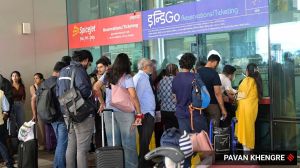Stay updated with the latest - Click here to follow us on Instagram
‘Soon to be world’s longest’: Ashwini Vaishnaw shares video of hyperloop tube developed by IIT Madras
A revolutionary transportation system concept, hyperloop involves moving pods - the transportation vehicles - through a near-vacuum tube at speeds exceeding 1000 kmph.
 With the addition of another 40 metres the hyperloop track would become the longest in the world. (Screenshot: Instagram/@ashwini.vaishnaw)
With the addition of another 40 metres the hyperloop track would become the longest in the world. (Screenshot: Instagram/@ashwini.vaishnaw)Union Railway Minister Ashwini Vaishnaw on Monday shared a video showing the longest hyperloop test track in Asia developed by researchers at IIT Madras.
Vaishnaw was attending an event at the institute’s Thaiyur Campus in Chennai, where hyperloop prototypes developed by students were being tested.
Built in collaboration with the Ministry of Railways, the track is about 410 meters in length, making it the world’s longest student-run hyperloop infrastructure.
The track marks another step towards realising the future of transportation, given the use of indigenous technology in its development.
Researchers are currently working on increasing the length of the tracks, and with the addition of another 40 metres it would become the world’s longest hyperloop infrastructure.
Longest Hyperloop tube in Asia (410 m)… soon to be the world’s longest.@iitmadras pic.twitter.com/kYknzfO38l
— Ashwini Vaishnaw (@AshwiniVaishnaw) March 16, 2025
Showcasing his optimism on the development of a working hyperloop model within a few years, Vaishnaw said, “In a few years from now we should have a good, working model,” he said, adding that the track was on an experimental stage.
Vaishnaw also said that he spoke with an official from the Integral Coach Factory (ICF) — known for producing components for the Vande Bharat coaches — on the development of high quality, smaller electronics for the pods. This, he said, will help create a proper ecosystem to make hyperloop a reality.
What is hyperloop?
A revolutionary transportation system concept, first ideated by Tesla and SpaceX CEO Elon Musk in 2013, the hyperloop involves moving pods — the transportation vehicles — through a near-vacuum tube at speeds exceeding 1000 kmph.
With the pods levitating on the tracks using magnetic fields, a technology similar to the one used in high-speed maglev trains notably in Japan, hyperloop vehicles can achieve greater speeds due to the virtually non-existent air friction in the tubes.







